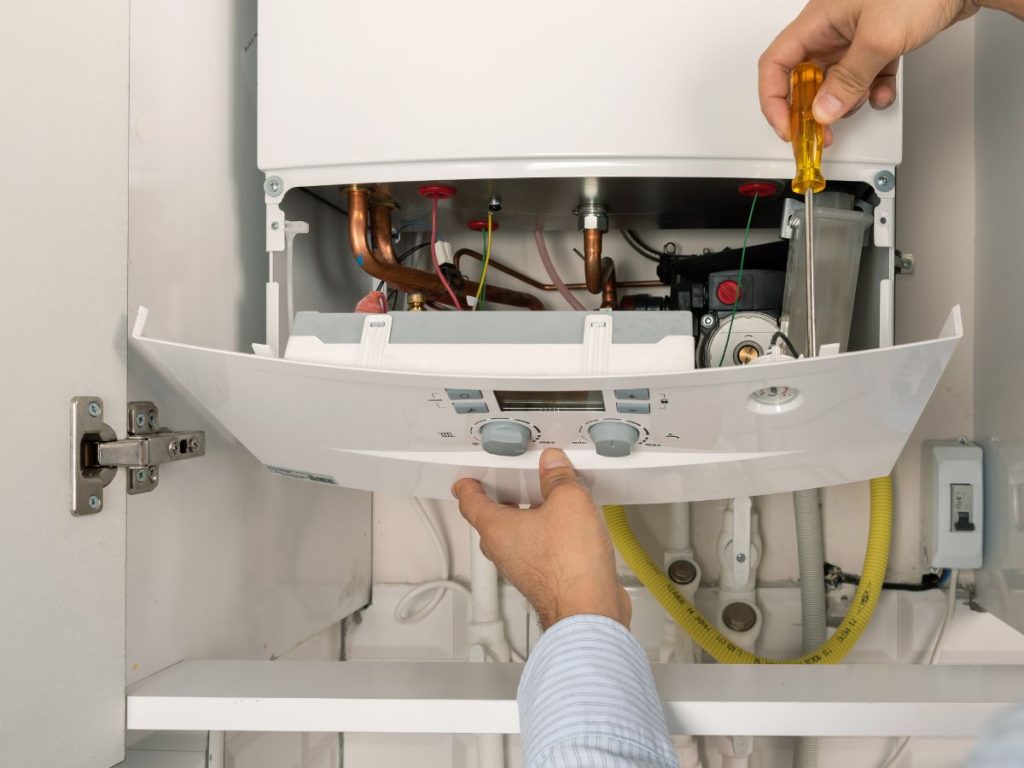When the chilly weather sets in, many homeowners rely on their boiler to keep their homes warm and comfortable. However, there’s nothing more frustrating than waking up to a freezing house because your boiler isn’t turning on.
While the problem could be as simple as a lack of electricity and energy or a tripped circuit breaker, it’s important to understand that there are several common problems that can cause your boiler to not turn on.
In this blog post, we’ll discuss some information on these issues and provide DIY fixes so you can get your heat back up and running without having to spend a fortune on boiler repairs. So if your home feels like an icebox because of a malfunctioning boiler, read on for some helpful tips and solutions.
Thermostat issues
One of the first things you should check when your boiler isn’t turning on is the thermostat. It’s possible that the settings have been inadvertently changed, or the device may not be functioning correctly.
Start by ensuring that the thermostat is set to heat and that the temperature is set higher than the current room temperature. If this doesn’t solve the problem, try replacing the batteries or resetting the thermostat according to the manufacturer’s instructions. Sometimes, a simple reset can resolve what seems like a significant issue.
Pilot light and ignition problems
Another common reason your boiler may not be turning on is due to the pilot light or ignition system. If your boiler has a pilot light, check to see if it’s lit. For those that use an electronic ignition system, listen for the sound of ignition when you turn your boiler on. If the pilot light is out or the ignition system isn’t working, your boiler won’t be able to produce heat.
For a pilot light, you can usually relight it following the instructions in your boiler’s manual. However, if you’re unsure or the ignition system seems to be the issue, it might be safer to call in a professional, who will be able to help no matter the type of boiler you have. Attempting to fix these problems without proper knowledge and experience can result in further damage or even danger.
Low water pressure
Most boilers require a certain level of water pressure to function correctly. If the water pressure is too low, it can prevent your boiler from turning on.
You can check the gauge on your boiler to see if the pressure is within the recommended range. If not, you may need to consult your boiler’s manual for instructions on how to increase the pressure. Keep in mind that this should be done carefully and cautiously, as too much pressure can also cause problems.
Airlocks
Airlocks are a common issue with boilers and can prevent them from turning on. If you haven’t used your boiler in a while or it’s been recently serviced, air can become trapped in the system and cause a blockage.
To fix this problem, you can try bleeding your radiators to release any trapped air. If that doesn’t work, contact a professional for assistance.
Blocked condensate pipe
During colder months, the condensate pipe of your boiler, which removes waste water, can freeze, causing a blockage. This blockage can prevent your boiler from turning on as a safety measure.
If you suspect your condensate pipe is frozen, you can try gently thawing it out by applying warm (not boiling) water over the pipe or using a hot water bottle. After thawing, reset your boiler to see if it solves the problem. Remember, never use direct heat, such as a blow torch, to thaw the pipe, as it can cause damage.
No hot water or heating
If your boiler turns on but fails to provide hot water or heating, it could indicate an issue with the internal components, such as the diverter valve. The diverter valve controls water direction within the boiler to either the radiators or the hot water outlets. Over time, this valve can become stuck or fail, leading to a lack of regular or water heating despite the boiler functioning.
To diagnose this problem, listen for unusual noises from the boiler when it attempts to switch modes between heating and hot water. If you suspect a faulty diverter valve, it’s best to consult with a professional technician who has a license and the education necessary to properly address the issue.
Attempting to repair or replace internal components without the right tools or experience can be both dangerous and may void any existing warranties on your boiler.
A unit that’s simply too old
Like any household appliance, a boiler’s efficiency and reliability decrease with age. Over time, parts wear out, technology becomes outdated, and it becomes more cost-effective to replace the unit rather than continue repairing it. In terms of how long a boiler lasts, if your boiler is over 15 years old, it may be time to consider replacing it with a newer, more energy-efficient model.
Not only can this reduce your energy bills, but it can also ensure your home remains warm and comfortable during the winter months. Upgrading your boiler can also be an opportunity to switch to a more sustainable and eco-friendly heating system, such as a condensing boiler, which reuses heat that would otherwise be wasted.
Before making a decision and to determine how much it’ll cost to get your boiler replaced, consult with a professional to discuss your options and what type of boiler would be best suited for your home and heating needs.
Lack of maintenance
Regular maintenance is essential and of particular relevance for keeping your boiler functioning properly. Neglecting regular servicing and cleaning can lead to problems like a leak, clogged filters, or buildup of debris, which can cause your boiler to not turn on.
To avoid this issue, be sure to schedule annual maintenance appointments with a qualified technician. They will be able to clean and inspect your boiler for any potential problems, ensuring that it continues to function efficiently.
If you’re experiencing boiler issues, contact Plumb-Tech
While these are some of the most common reasons why a boiler may not turn on, there can be other underlying issues that require professional help. If you’ve tried these DIY fixes and are still experiencing problems, it’s best to call in a qualified technician for further assistance.
Remember, safety should always come first when dealing with heating systems, so never attempt to fix something beyond your knowledge or capabilities. With proper maintenance and care, your boiler will continue to keep your home warm and cozy during the cold winter months.
If you’re experiencing problems with your boiler, consider getting in touch with Plumb-Tech for expert services. Our team of skilled technicians can help diagnose the issue and provide efficient solutions to get your home’s heating system up and running again.
We operate in Missoula, Montana and surrounding areas in the community, and our individual technicians have the experience, licensure, and skills necessary to help. Whether you’re experiencing problems with a boiler, furnace, or water heater, we’ve got you covered. Having been in business for over 15 years, we’re the best in the industry.
Don’t let a malfunctioning boiler leave you in the cold. We’re only one telephone call or website form fill away—contact us today!





